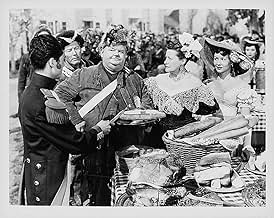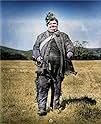CALIFICACIÓN DE IMDb
6.4/10
3.8 k
TU CALIFICACIÓN
En 1818, en Alabama, los colonos franceses se enfrentan al codicioso acaparador de tierras Blake Randolph, pero el miliciano de Kentucky John Breen, que está enamorado de la francesa Fleuret... Leer todoEn 1818, en Alabama, los colonos franceses se enfrentan al codicioso acaparador de tierras Blake Randolph, pero el miliciano de Kentucky John Breen, que está enamorado de la francesa Fleurette De Marchand, acude en ayuda de los colonos.En 1818, en Alabama, los colonos franceses se enfrentan al codicioso acaparador de tierras Blake Randolph, pero el miliciano de Kentucky John Breen, que está enamorado de la francesa Fleurette De Marchand, acude en ayuda de los colonos.
- Dirección
- Guionista
- Elenco
Fred Aldrich
- Militiaman
- (sin créditos)
- Dirección
- Guionista
- Todo el elenco y el equipo
- Producción, taquilla y más en IMDbPro
Opiniones destacadas
In 1817, following a land-grant Act of Congress, written to aide Napoleon-supporters in the War of 1812, 340 French families settled on four townships in Alabama. They arrived in Mobile, Alabama on the ship "McDonough" and made their headquarters in a small community named "White Bluff." A year later, with the community developed into a thriving village by their labors, they renamed it "Demopolis," an ancient Greek name meaning "City of the People." These Napoleonic exiles chose not to give it a French name that would recall their native land.
These cultured colonists, from the drawing rooms and military heritage of the old French aristocracy, were likely the least-prepared of any of the immigrant groups who settled the American wilderness, and soon found themselves pioneering the rugged interior of Alabama with illiterate traders, squatters and Indians for their neighbors. They called themselves "The Association of French Emigrants for the Cullivation of the Vine and Olive", but their attempt at olive and grape culture was a complete failure. The Indians taught them how to grow corn and beans, but when they discovered that through a surveying error they inadvertently had built their city outside the chartered boundaries, they drifted away, either returning to France or settling in Mobile or New Orleans. But Napoleon was no great hand when it came to reading maps and recognizing boundaries, either.
Director/writer George Waggner took the surveying mistake and converted it to a land-grab scheme, threw in a motley group of rugged Kentucky militiamen, returning from the Battle of New Orleans, used the most diverse cast in any of the American-frontier films from Republic...and then tossed in ten pounds of plot into a five-pound container. Most of which worked. Aside from the thematic song, a traditional called "Kentucky Marching Song", in which he wrote new lyrics to go with George Anthiel's arrangement. Neither of which, apparently, spent much time on the writing or the arranging.
These cultured colonists, from the drawing rooms and military heritage of the old French aristocracy, were likely the least-prepared of any of the immigrant groups who settled the American wilderness, and soon found themselves pioneering the rugged interior of Alabama with illiterate traders, squatters and Indians for their neighbors. They called themselves "The Association of French Emigrants for the Cullivation of the Vine and Olive", but their attempt at olive and grape culture was a complete failure. The Indians taught them how to grow corn and beans, but when they discovered that through a surveying error they inadvertently had built their city outside the chartered boundaries, they drifted away, either returning to France or settling in Mobile or New Orleans. But Napoleon was no great hand when it came to reading maps and recognizing boundaries, either.
Director/writer George Waggner took the surveying mistake and converted it to a land-grab scheme, threw in a motley group of rugged Kentucky militiamen, returning from the Battle of New Orleans, used the most diverse cast in any of the American-frontier films from Republic...and then tossed in ten pounds of plot into a five-pound container. Most of which worked. Aside from the thematic song, a traditional called "Kentucky Marching Song", in which he wrote new lyrics to go with George Anthiel's arrangement. Neither of which, apparently, spent much time on the writing or the arranging.
7tavm
Back in the late '70s-early '80s, my local station of WBRZ-2 had aired the "John Wayne Theatre"-which showed many of his movies, primarily from Republic. This was one of the movies from that studio-Wayne's home for a great many years. When stumbling into this one on a Sunday afternoon, I was pleasantly surprised to see among the players one Oliver Hardy-a rare film he made without his usual teammate Stan Laurel. I taped this picture in the mid '90s off of American Movie Classics but didn't watch it until now. I'll just now say that Mr. Hardy is quite an amusingly pleasing presence doing some of his familiar mannerisms but also a little different from his "Ollie" character. The highlight may be a fiddler-playing sequence of which Hardy's Willie Payne can play but Wayne's character can't! There's more but I'll just say go ahead and watch The Fighting Kentuckian if the mood fits you! P.S. This version had wraparounds by host Nick Clooney-George's father. In the beginning one, he mentions leading lady Vera Ralston had given Hardy a gift of a deck chair-specially made to fit his girth! In the one after the movie, he erroneously mentions this was Ollie's final film-his actual very last one was Atoll K (Utopia in the U.S.), once more with Stan Laurel. Oh, and since one of the locations of The Bluegrass State mentioned in the movie was Lexington, I have to mention that my family had briefly lived there in '74-'75 and my youngest sister and sibling was born there.
An American Western-comedy; A story set in Alabama, 1812, about a Kentucky trooper who makes a long journey homeward with his army confrère and becomes involved with a robber baron's plan to deprive hundreds of French army refugees of land promised by Congress, and he acts to prevent the villain's marriage to the daughter of a former French general. This is a routine Western with incessant chases and gunfire. The romance is stilted with no chemistry between John Wayne and Vera Ralston, who sounds more Czech than French. However, it is a boisterous distraction with sparkling photography, and the excellent comedy performances shine through its medicore storyline. John Wayne has screen presence, and his light humour complements the piece very well, never overshadowing Oliver Hardy's marvellous physical comedy, which is a treat to watch: two great light comedy performances. As an aside, though, Hardy is only slightly pugnacious here, which will feel muted in comparison to his high acclaim for his other pictures acting alongside Stan Laurel.
I'd never heard of this one before and didn't know John Wayne had acted alongside Ollie Hardy until today. I like both though and I do enjoy a Western and this was a very enjoyable Western.
This movie is pure Republic Pictures B-movie all the way, with relatively low production values, Vera Ralston (girlfriend of the CEO) and lots of action. And this is not necessarily a bad thing (apart from the lousy acting by Ralston), as the movie is highly entertaining. So, if you just turn off your brain and enjoy, this is a terrific film. I particularly love seeing Oliver Hardy playing a rare supporting actor role very late in his career. Is he believable? Not in the least. But, he's funny and quite the sidekick to John Wayne. The plot, such as it is, involves Wayne falling for Cajun Ralston (a Swedish actress playing a Creole woman?!) and getting into a wide variety of scraps along the way. Not much more to it than that but it is so much fun, who cares?! I can forgive all this because the film is somehow charming and memorable.
¿Sabías que…?
- TriviaJohn Wayne was so pleased with the chemistry between him and Oliver Hardy that he offered Hardy the role of "permanent comic sidekick" in subsequent movies. By the time this picture was released, Stan Laurel had recovered from his illness and was able to return to the Laurel & Hardy team so Hardy declined Wayne's offer.
- ErroresAuto tire tracks visible in dust during wagon and horse chase scene.
- Citas
[repeated line]
Willie Paine: I'll see to the horses.
- Versiones alternativasAlso available in a computer colorized version.
- ConexionesFeatured in Frances Farmer Presents: The Fighting Kentuckian (1959)
- Bandas sonorasLet Me Down, Oh Hangman
(uncredited)
Traditional
Music Arranged by George Antheil
New Lyrics by George Waggner
Selecciones populares
Inicia sesión para calificar y agrega a la lista de videos para obtener recomendaciones personalizadas
- How long is The Fighting Kentuckian?Con tecnología de Alexa
Detalles
Taquilla
- Total en EE. UU. y Canadá
- USD 1,550,000
- Tiempo de ejecución
- 1h 40min(100 min)
- Color
- Relación de aspecto
- 1.37 : 1
Contribuir a esta página
Sugiere una edición o agrega el contenido que falta
























